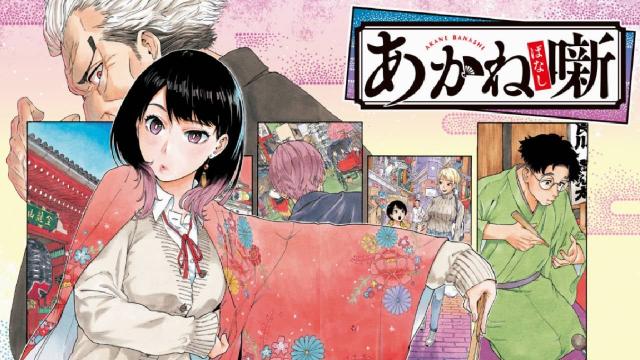I started reading Akane-banashi because I didn’t want to start a manga that was hundreds of chapters long. I thought that I’d be able to briefly sample a new series, cancel my Shonen Jump sub, and then go back to chipping away at my games backlog. But Akane-banashi caught me completely flat-footed with its expressive art, lighthearted comedy, and dramatically satisfying arcs. Several months later, rereading Akane-banashi remains the primary reason I still pay for that sub, and reading a new (free) chapter every Sunday is my favourite part of the weekend.
Akane-banashi tells the story of Akane Osaki, a teenage girl who pursues a theatrical art form called rakugo. In rakugo, a single performer tells comedic or dramatic stories using only their body language, facial expressions, and varying tone. The artist has to perform every personality in the story, and rakugo skits always involve multiple characters.
Several years ago, Akane’s father was unceremoniously expelled from the rakugo school, so she’s pursuing professional rakugo to both get answers about his expulsion and redeem his art in the eyes of the public. Unfortunately, the man who destroyed her father’s career is also the most important figure in the entire rakugo world, so the stakes of making people laugh are incredibly high.
Despite the emotionally heavy premise, Akane-banashi is a lighthearted series that truly shines when it shows the creators’ deep love of rakugo. The performances are incredibly fun to read, since the artist draws hilariously exaggerated expressions that seem just a little inappropriate on the beautiful and graceful performers. Leading actors in most fictional works only have to be beautiful and charming. In the rakugo of Akane-banashi, they also get to be slovenly, arrogant, and obnoxious.
Every performance transforms the artist into someone completely new without props or outside assistance. In one panel, a rakugo performer is a cowardly old man who spends too much money. In another, he’s the strong-willed and devious wife. And the drama feels easy to follow because the manga tends to err on the side of over-narrating the performances. If theatre is trickery, then Akane-banashi’s rakugo is honest trickery. The jokes are straightforward, but everyone’s in on the joke.
I enjoy rereading Akane-banashi as a gentle palate cleanser for other shonen manga. Despite the overall competitive atmosphere of the recent arc, its sense of humour remains irreverent without being mean-spirited or crass. The characters are respectful toward each other, cognisant of others’ creative talents, and never demean the competition. The stakes still feel high, and I want Akane to impress all the adults who write her off for being young. But I’m having such a fun time watching her develop as an artist, I don’t feel like I’m in any rush to see her score major “wins.”
This is such a welcome change from most shonen manga, such as Demon Slayer, in which the protagonist practically destroys themselves in order to reach the next power level. I even had to stop reading slice-of-life manga like Bakuman because it just seemed to advocate in favour of burnout. Akane-banashi charms you early, gets you slowly invested in the characters, and employs its own dramatic skill to reel you in.
The slower pace also extends to how it structures the stories. Akane-banashi often takes multiple chapters for a rakugo performance to arrive at its final punchline. The joke itself isn’t the point. Instead, much of the drama comes from the narration from other characters in the audience.
Much like how a friend explaining a sports game is often more interesting than the match itself, Akane-banashi shines when the rakugo performers’ peers and colleagues meticulously break down and analyse the theatrical decisions they make in their performance. That’s why some streamers are more fun to watch than others despite playing the same game. Akane-banashi isn’t just stubborn about retaining the authenticity of rakugo; it’s very intentional about making sure that the audience has a good time.
I’m not the only one who has good taste in shonen manga. The first volume of Akane-banashi was praised by One Piece’s famous creator, Eiichiro Oda. And just recently, Neon Genesis Evangelion’s director Hideaki Anno joined him in recommending the series to new readers. Akane-banashi is a newcomer that breaks from many shonen manga conventions, but it’s nevertheless a confident work that always seems to stick the landing in its storylines.

Leave a Reply